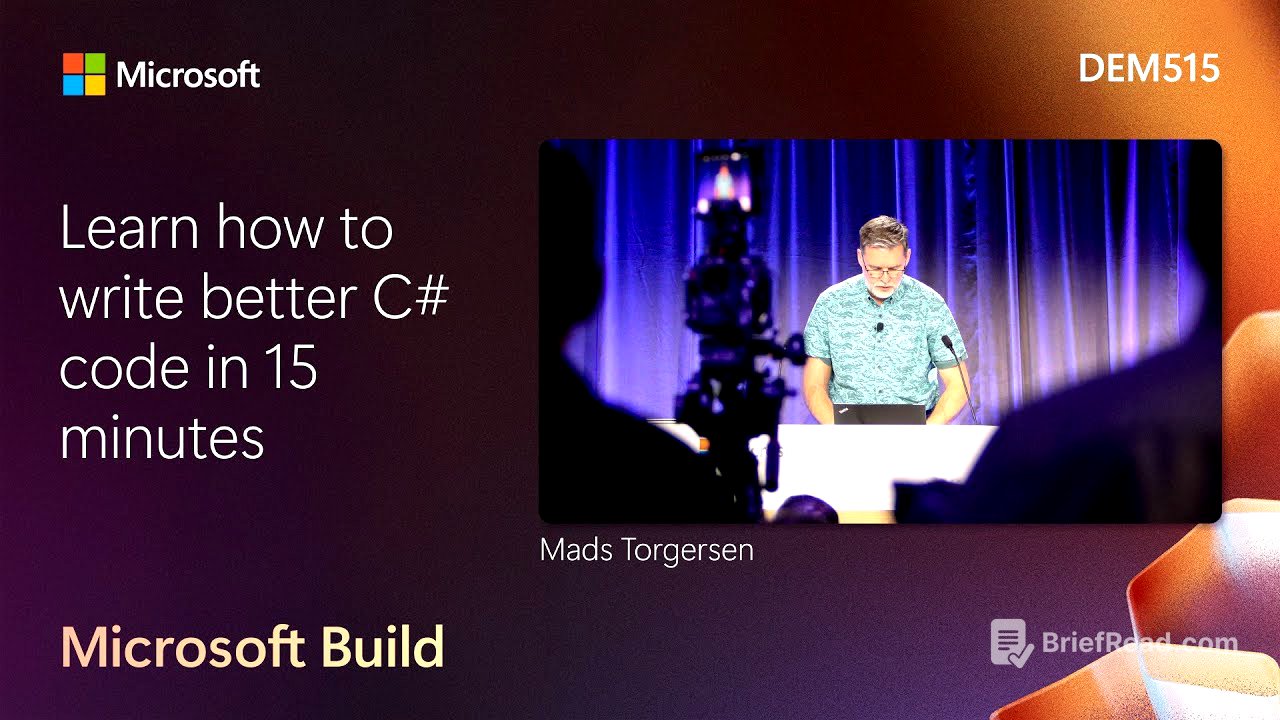TLDR;
Matt Torgeson, the lead designer of C#, discusses underutilized C# features: pattern matching, records, and collection expressions. These features simplify syntax, improve code safety and correctness, and enable compiler optimizations. The talk covers how pattern matching enhances is expressions and switch statements, how records facilitate value-based object representation, and how collection expressions provide a unified syntax for collection initialization.
- Pattern matching simplifies type checking and data extraction, making code more expressive and safer.
- Records enable value-based equality and provide enhanced
toStringfunctionality, simplifying immutable data management. - Collection expressions offer a unified and efficient syntax for initializing various collection types.
C# Features Highlight: Pattern Matching, Records, and Collection Expressions [0:00]
Matt Torgeson introduces three C# features that are often underutilized: pattern matching, records, and collection expressions. These features aim to simplify syntax, improve code safety, and enable compiler optimizations. The presentation promises to demonstrate how adopting these features can lead to more efficient and maintainable code.
Introduction to Using Patterns in Expressions [4:21]
The discussion begins with pattern matching, illustrating its use in a traditional type hierarchy. The example involves a render method that needs to be implemented outside the class hierarchy. Traditional approaches using is expressions are compared with pattern matching, which allows for type checking and data extraction in a more concise way.
Transition from 'is' Expressions to 'switch' Statements [4:37]
The presentation transitions from using is expressions to switch statements to handle multiple derived classes. It explains how patterns can be used in switch statements, unifying switch and is expressions. A new switch expression flavor is introduced for scenarios where branches produce results that can be expressed in a single expression, offering a more stylish syntax.
Compiler Optimizations with Patterns in Switch Statements [6:36]
The discussion highlights compiler optimizations when using switches with patterns. The compiler optimizes the evaluation order for efficiency and performs additional checks. A bug related to indexing into an empty string is identified and fixed using a when clause in the switch statement, demonstrating how to handle specific conditions.
Making Code Safer with Feedback [7:53]
The safety aspects of using patterns are emphasized, with the compiler providing feedback on non-exhaustive switches and unreachable code. The presentation explores various kinds of patterns, including property patterns and relational patterns, showcasing their flexibility in expressing complex conditions. Examples include checking the length of a string and using list patterns to validate list contents.
Value Representation with Records [10:54]
The presentation shifts to records, explaining how they are used to represent values rather than stateful objects. Records flip the default behavior of classes, implementing value-based equality. This means that two records are considered equal if their contents are the same, rather than comparing references.
Enhanced toString Functionality [12:05]
Records come with enhanced toString functionality, which lists all the values inside the record. When updating information, records promote immutability by creating new records instead of mutating existing ones. The object initializer syntax is used to create copies with updated values, ensuring that the runtime type and hidden values are preserved.
Detailed Explanation on Records and Parameters [13:24]
Records allow primary constructors that automatically implement properties. The use of primary constructors can simplify code, but it may also lead to parameter accumulation in deep hierarchies. The presentation introduces the concept of passing parameters up the chain and demonstrates how to use a decimal array for grades.
Collection Types and Their Handling [14:49]
The final topic is collection expressions, which provide a unified syntax for initializing various collection types. Collection expressions work for mutable and immutable types, as well as interfaces, and the compiler chooses the most efficient implementation. This feature simplifies collection initialization and offers better performance than manual implementations.









